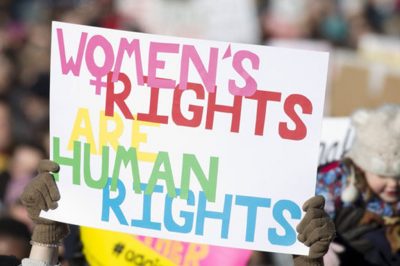Empowering women is an essential human rights matter and a social justice issue. It is critical to continue efforts to remove gender-based discrimination and build a world in which women may fully enjoy their rights and contribute to society on an equal footing as men. International organizations are crucial in promoting gender equality and women’s rights because they understand the importance of working together globally. It is necessary to investigate international organizations’ complex role in promoting and safeguarding women’s rights, emphasizing their shared responsibility in combating gender-based discrimination and establishing a more equitable society.
Gender discrimination occurs around the world, manifesting in a variety of ways, including violence, unequal access to school and employment, and limited reproductive rights. Data and statistics by the United Nations about women’s rights worldwide highlight the achievements and the ongoing issue. Despite progress, there is still a gender wage disparity that affects women worldwide. According to the World Economic Forum’s Global Gender Gap Report 2023, the global gender pay gap is 16%, demonstrating income differences between men and women. The UN reports that just 50% of working-age women worldwide are in the labor force, compared to 80% of men, highlighting women’s difficulties in accessing economic opportunities.
According to UN statistics, one in three women globally has been victims of sexual or physical abuse, frequently by a close relationship. The World Health Organization (WHO) estimates that approximately 35% of women worldwide have experienced either intimate partner violence or non-partner sexual violence in their lifetime. Efforts to end violence against women are critical to their safety and well-being.
Empowered women can engage more in social, economic, and political arenas. However, they are underrepresented in leadership positions in politics and business. According to the Inter-Parliamentary Union, as of 2023, women hold only 26.1% of parliamentary seats globally. Although progress has been achieved in women’s access to education, inequities remain. According to UNESCO, 129 million girls are not attending school as of 2018.
How Important Are International Organizations for Women’s Rights
International organizations are essential in advancing women’s rights and fostering gender equality, recognizing the collective responsibility to uphold human rights globally. These organizations, such as the United Nations (UN), International Women’s Rights Action Watch (IWRAW), Organization of Islamic Cooperation (OIC), and the International Labor Organization (ILO), serve as influential platforms to advocate for policies that protect and empower women.
Through conventions, resolutions, and collaborative initiatives, they establish frameworks that address issues like gender-based violence, discrimination, and unequal access to education and employment. International organizations contribute to creating an inclusive and equitable world by promoting gender-sensitive policies and monitoring compliance. Additionally, they facilitate knowledge exchange and capacity-building initiatives, fostering a global community committed to dismantling barriers that impede women’s rights and ensuring that women everywhere can enjoy the full spectrum of human rights.
International organizations have acknowledged that addressing violations of women’s rights is essential to ensure all human rights. International organizations advocate women’s rights and raise global awareness about gender-based concerns. They use their platforms to bring attention to issues such as violence against women, economic inequities, and hurdles to education and healthcare.
These organizations support women’s empowerment by offering resources, education, and skill development through various programs and initiatives. International organizations work with member states to create and execute policies that address gender inequality. This includes encouraging legislative changes, campaigning for equal opportunities, and creating circumstances encouraging women’s participation in diverse areas. They also track member states’ progress towards gender equality targets. They hold countries responsible for the promises made under international accords using regular assessments and reports.
Recognizing the interdependence of global concerns, international organizations work with governments, NGOs, and other stakeholders. This cooperative approach addresses Women’s rights issues more thoroughly and efficiently. They support programs that promote gender equality. By channeling financial assistance towards programs addressing women’s rights, these organizations contribute internationally to actual advances in women’s lives. Additionally, international organizations work to persuade governments and decision-makers to give women’s rights a priority through diplomatic means. They support a global commitment to gender equality as a shared responsibility through diplomatic channels.
Role of the United Nations (UN) in Women’s Human Rights
Women’s empowerment is critical to ensuring human rights and fostering sustainable development. International organizations are essential in advocating for and upholding women’s rights globally. Among these organizations, the United Nations (UN) stands out as a significant player in promoting gender equality and empowering women. This essay will explore the multifaceted role of the UN in advancing women’s rights and how it contributes to the collective responsibility of international organizations.
The UN has a rich history of addressing gender inequality and promoting women’s rights. The landmark Beijing Declaration and Platform for Action in 1995 marked a turning point, setting forth a comprehensive agenda for the advancement of women. Since then, various UN entities, such as UN Women, have been at the forefront of advocating for women’s empowerment through policy formulation, capacity-building initiatives, and fostering international cooperation.
The UN has played a crucial role in developing and reinforcing international norms and standards for women’s rights. Instruments like the Convention on the Elimination of All Forms of Discrimination against Women (CEDAW) provide a comprehensive framework for protecting and promoting women’s rights. The UN’s efforts in adopting and monitoring the implementation of such conventions create a foundation for global consensus on gender equality. The UN engages in policy advocacy and capacity-building activities through its various agencies to empower women. UN Women, in particular, focuses on promoting gender-responsive policies and legislation, fostering women’s leadership, and providing technical assistance to member states.
By collaborating with national governments and civil society, the UN contributes to building institutional capacity for effective gender mainstreaming. The UN recognizes the disproportionate impact of armed conflicts on women and has taken steps to address this issue. Resolutions such as UNSCR 1325 emphasize the importance of women’s participation in peacebuilding, conflict prevention, and post-conflict reconstruction. The UN’s commitment to integrating a gender perspective into peacekeeping operations creates safer environments for women and girls in conflict zones.
Economic empowerment is a crucial aspect of women’s rights, and the UN has implemented initiatives to address economic disparities. Programs promoting women’s entrepreneurship, access to finance, and vocational training enhance economic opportunities for women. The UN’s emphasis on closing the gender pay gap and promoting women’s participation in the workforce aligns with the broader goal of achieving sustainable development.
The UN recently announced initiatives like HeForShe and UN Women to raise awareness about gender equality and women’s empowerment. The Sustainable Development Goals (SDGs), particularly Goal 5 (Gender Equality), emphasize the commitment to attaining gender equality and empowerment for all women and girls by 2030.
Position of the Organization of Islamic Cooperation (OIC) in Women’s Right
The Organization of Islamic Cooperation (OIC) plays a crucial role in advancing and upholding women’s rights within the context of its member states, which span diverse cultures and traditions. Recognizing the importance of empowering women, the OIC has undertaken initiatives to promote gender equality, social justice, and human rights across its member countries. The OIC strives to foster a collective commitment to addressing the unique challenges that women may face in different cultural contexts while also promoting shared principles of equality and justice.
Through collaborative efforts, the OIC aims to enhance legal frameworks, educational opportunities, and economic empowerment for women, ultimately contributing to a more inclusive and equitable society within its member states. As an international organization, the OIC is responsible for fostering dialogue, cooperation, and advocacy to ensure that women’s rights are safeguarded and promoted within the diverse sociocultural landscapes of its member nations.
In the Muslim world, The Organization of Islamic Cooperation (OIC) underlines its commitment to advancing and defending women’s rights among its member states in its Cairo Declaration on Human Rights. It emphasizes that women have the same human dignity as men and should be granted the same rights and responsibilities. This proclamation recognizes a variety of women’s rights, including the right to preserve their name and lineage, marry with full permission, and be free of all types of violence, abuse, and harmful traditional customs. It also acknowledges the independent financial status and unique legal identity of women.
Adopted in 1990 by the Organization of Islamic Cooperation (OIC), the Cairo Declaration on Human Rights in Islam does offer a framework for comprehending human rights through Sharia, the legal code of Islam. The United Nations’ Universal Declaration of Human Rights (UDHR) and its concept of human rights are fundamentally different, even if it recognizes some freedoms and rights.
States in the Organization of Islamic Cooperation (OIC) are asked to remove obstacles to women’s empowerment, encourage access to high-quality education, grant employment possibilities, guarantee equal work opportunities, and ensure that women can enjoy their human rights in all contexts and at all levels. This pledge indicates the group’s determination to improve women’s lives and combat gender inequality in the OIC member states. These principles are outlined in the Cairo Declaration. However, it is essential to remember that national execution makes such promises successful.
Also Read: A health worker’s tireless journey towards a Polio-Free Pakistan
Women’s empowerment is a shared obligation that crosses borders. International organizations are essential in establishing the global narrative on women’s rights, encouraging collaboration, and keeping countries responsible for adhering to their commitments.
The United Nations is at the forefront of efforts to promote gender equality, highlight ongoing inequalities, and create a more just global community. This organization advocates building capacity, developing policies, and collaborating to achieve a more just society where women may exercise their human rights without fear of discrimination or persecution. While the Organization of Islamic Cooperation (OIC) reflects a commitment to women’s rights within a specific regional context, addressing the multifaceted challenges and disparities worldwide requires collaborative endeavors at both regional and international levels.
The Cairo Declaration on Human Rights in Islam recognizes women’s equal human dignity and outlines their rights. However, the challenge lies in interpreting and applying these rights across culturally diverse OIC member states.
Sustained worldwide efforts and dedication to defending the rights and dignity of women everywhere are necessary to achieve gender equality. It can only be achieved by concerted, long-term international action. International organizations, such as the United Nation and the Organization of Islamic Cooperation, play critical roles in establishing the narrative surrounding women’s rights and holding governments accountable. To attain gender parity, it is imperative to recognize and tackle cultural subtleties, exchange optimal methodologies, and cultivate a communal dedication to maintaining the rights and honor of women globally. Through coordinated efforts, we can build a more just and equitable global society where women can practice their human rights without fear of discrimination or persecution.

Muhammad Amjad Raza is a research scholar in Political Science. Presently, he is doing PhD studies at GC University Faisalabad. His areas of research include Non-traditional security threats, Environmental Politics and Sustainable Development and Foreign Policy Analysis (FPA). He can be contacted at amjadraza96@yahoo.com.







